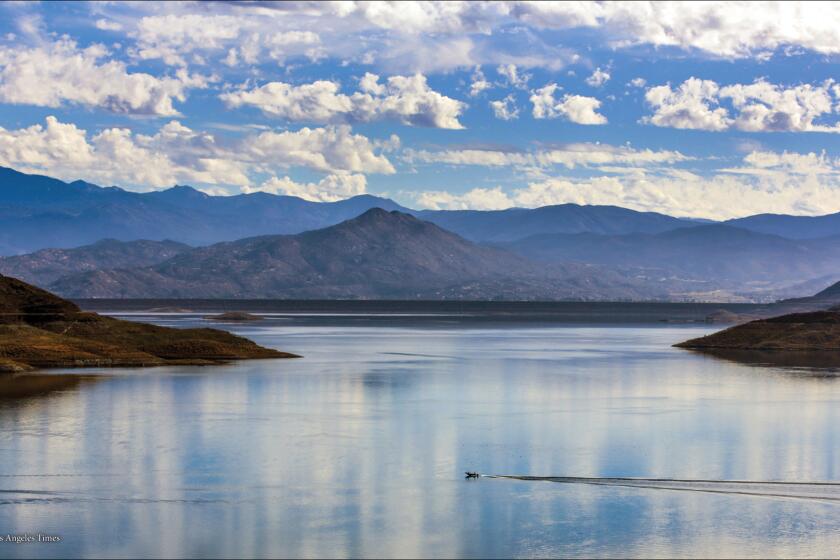After a bitter fight, Southern California’s water kingpin has a new leader
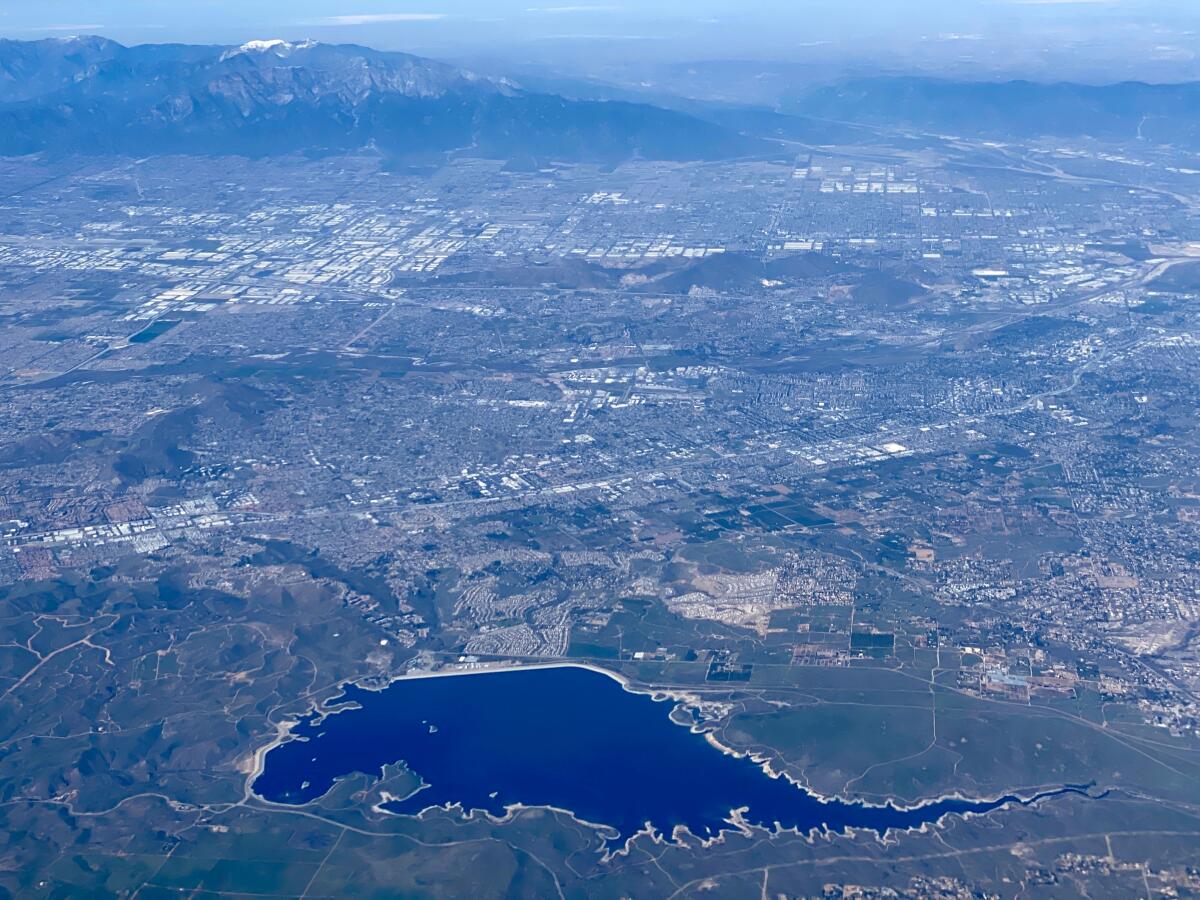
- Share via
The Metropolitan Water District of Southern California has hired Adel Hagekhalil as its next general manager, following a bitter power struggle over the future of an agency that delivers hundreds of billions of gallons each year from the Colorado River and Northern California to a region that otherwise wouldn’t have nearly enough water to support 19 million people.
Hagekhalil was previously second in command at the Los Angeles Bureau of Sanitation, where he helped develop strategies for cutting the city’s use of imported water — and therefore its reliance on Metropolitan. He said he’ll bring a shift in focus to the agency, putting more emphasis on recycling sewage water, capturing rainwater and cleaning up groundwater aquifers.
Those local supplies could help fortify Southern California against climate change, which is fueling what some scientists describe as “aridification” across the American West. The region is currently suffering yet another drought, with California’s Sierra Nevada snowpack almost entirely gone as summer gets underway and several other states experiencing record dryness.
L.A. Mayor Eric Garcetti called Hagekhalil the right person to address those challenges.
“Adel is a proven leader and a visionary public servant who sees every policy decision through a lens of sustainability and conservation, and knows the importance of reducing our reliance on imported water,” Garcetti said in a written statement. “There’s never been a more critical time for our region to lead the charge toward smarter uses of our precious natural resources, and I have no doubt that Adel will rise to the challenge of this once-in-a-generation opportunity to re-make our water future.”
Hagekhalil told the Metropolitan board before Tuesday’s vote that his experiences as an immigrant and a person of color would help him ensure “that we’re serving every member of our community regardless of where they are and their economic condition.”
“What we need is to provide our communities a reliable, sustainable and affordable water supply,” he said.
The board’s vote was razor thin, and followed months of behind-the-scenes maneuvering that pitted L.A. and San Diego officials against their Orange County counterparts as they debated how to replace outgoing head honcho Jeff Kightlinger.
The spat spilled into public view Tuesday, with several directors accusing their colleagues of leaking details of the selection process to the press and others questioning whether Hagekhalil, a civil engineer, has the right experience and skills to lead the powerful agency.
Specifically, Hagekhalil’s detractors worried he doesn’t know enough about the Colorado River — an especially important topic as Metropolitan gears up for high-stakes negotiations over how to share the pain of expected cutbacks. The river provides drinking water for 40 million people and millions of acres of farmland in seven states, and it’s dwindling as temperatures rise.
Larry Dick, representing the Municipal Water District of Orange County, said he’s “firmly convinced we need people with expertise in that area.” He ultimately abstained from the vote, as did all but one of the directors who opposed Hagekhalil.
Other directors questioned Hagekhalil’s position on a controversial multibillion-dollar plan to keep Northern California river water flowing south by digging a massive tunnel beneath the Sacramento-San Joaquin River Delta near the Bay Area. He was also asked his position on seawater desalination, which like the Delta tunnel faces opposition from environmentalists. It was a bizarre scene that saw his critics press him for answers just minutes before the vote, even after it was clear his supporters had enough votes.
Hagekhalil avoided taking a firm position on desalination but said he supports the tunnel — as long as Metropolitan is also “doubling down” on local water supplies. Growing Southern California’s use of local resources, he said, would make it easier to resolve the environmental conflicts that have dogged the Delta, and to negotiate from a strong position on the Colorado River.
“What worked for us over the last 100 years is not going to carry us forward over the next 100 years. We need to think differently,” Hagekhalil said in an interview after the vote.
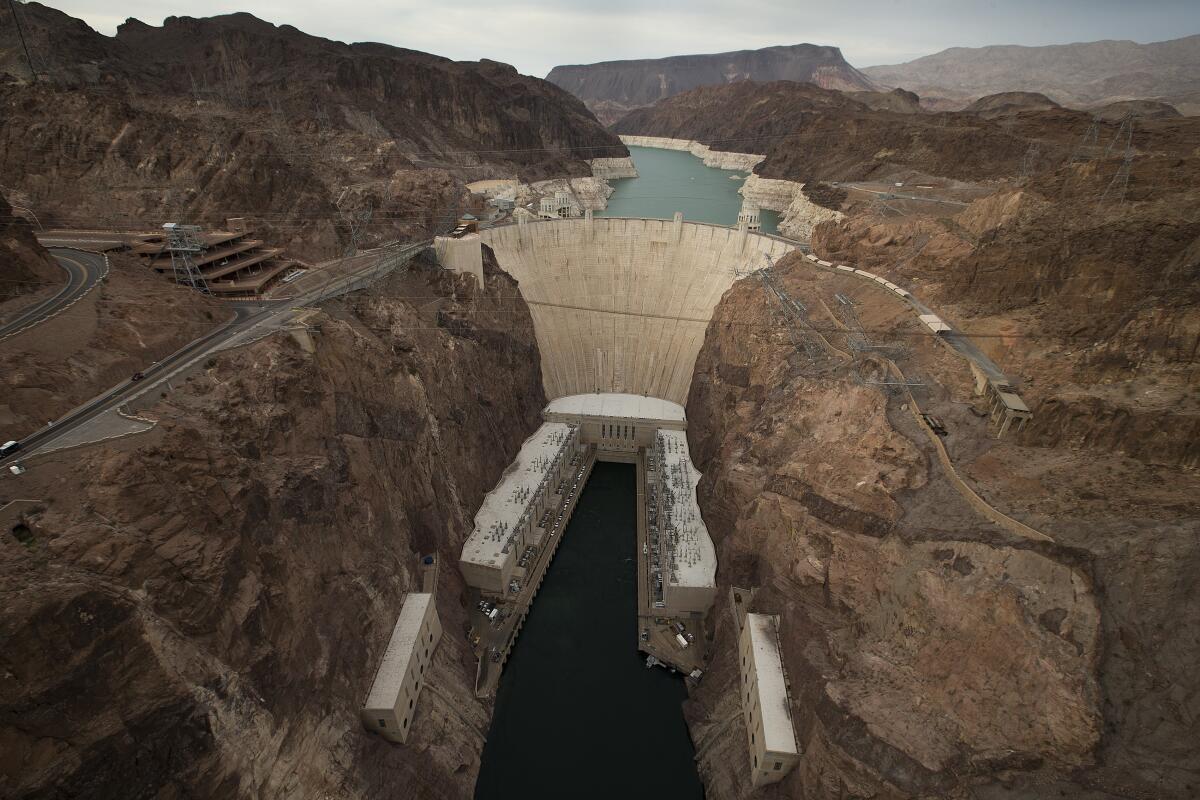
Hagekhalil’s critics, including several Orange County officials, had pushed for Pat Mulroy to get the top job, as The Times first reported. Mulroy once led the Southern Nevada Water Authority, where she helped the Las Vegas Valley grow dramatically despite a relatively limited supply of Colorado River water from Lake Mead. She was dubbed the “water witch” by her adversaries.
Hagekhalil beat out Mulroy and four other candidates in an initial vote at the Metropolitan board last month, winning 50.4% of the weighted vote — in which larger cities and water districts have a larger say — compared to Mulroy’s 46.8%. He was supported by all five of Garcetti’s appointees on the 38-member board, along with officials from San Diego County and several other cities.
The choice of Adel Hagekhalil to lead the Metropolitan Water District is exposing deep disagreements.
But his hiring couldn’t be finalized until the board approved a contract, and Mulroy’s supporters didn’t give up.
Shortly after the vote, information about two lawsuits against L.A.’s sanitation department was emailed to the board at the request of Orange County representative Sat Tamaribuchi. One of the suits, involving sexual harassment, led to a multimillion-dollar jury verdict but didn’t name or implicate Hagekhalil. The other included claims that Hagekhalil retaliated against an employee for testifying in the first suit, and accused him of “systematic anti-Chicano racist promotional practices and policies.”
Hagekhalil’s critics suggested the suits raised questions about his ability to lead an agency that has been rocked by allegations of sexual harassment. His supporters pushed back, noting that it’s common for public agencies to face lawsuits and that Hagekhalil was not accused of sexual misconduct. A union representing more than 10,000 L.A. city workers sent a letter to the Metropolitan board calling Hagekhalil an “exemplary leader” who has “worked to build a culture of inclusion, respect, and fairness.”
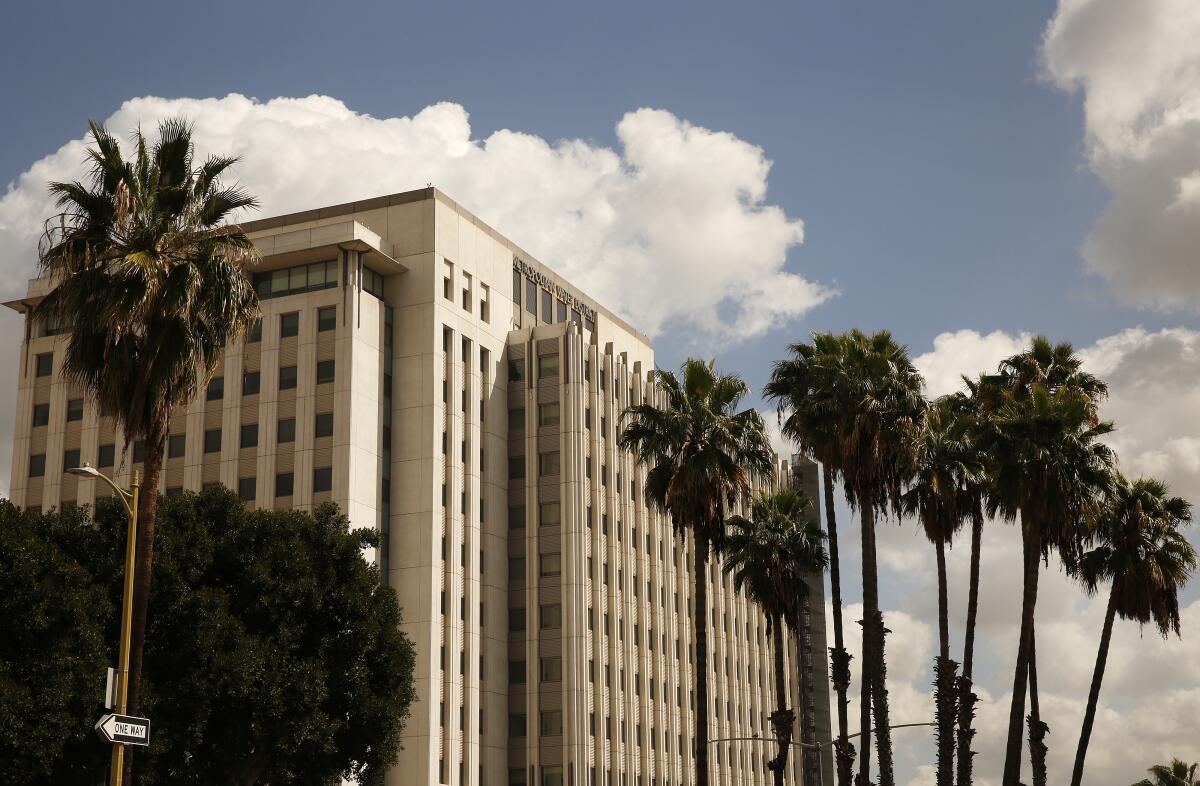
That didn’t stop some officials from searching for ways to undermine his candidacy, documents obtained by The Times show.
The Municipal Water District of Orange County submitted a public records request to Los Angeles on May 28, seeking grievances and lawsuits filed against the city’s sanitation and street services departments during Hagekhalil’s time at those agencies.
That prompted a sharp rebuke from San Fernando representative Adán Ortega, who sent an email to other Metropolitan board members accusing the Orange County water wholesaler of “hardball bullying tactics” with an apparent goal of “intimidating those of us who voted for the prevailing candidate.” Orange County officials pushed back, writing that Hagekhalil’s record “does not appear to be one of positive cultural change” and suggesting earlier disclosure of the lawsuits could have changed the vote.
Ultimately, that didn’t happen, despite several directors grilling Hagekhalil about the details of the suits before Tuesday’s vote.
After The Times broke the news of the behind-the-scenes turmoil last month, the Metropolitan board received dozens of letters supporting Hagekhalil’s candidacy from his employees and colleagues, environmental groups, elected officials and others.
A coalition including L.A. Waterkeeper, Restore the Delta and the Sierra Club Angeles Chapter called him “the right choice during this time to heal the organization and prepare our region in the face of persistent drought and changing climate.” The Arab American Assn. of Engineers and Architects’ California chapter praised his “successful track record managing a diverse workforce, delivering high-quality services, overseeing substantial infrastructure investments and supporting disadvantaged communities.”
Thirteen L.A. City Council members signed letters supporting Hagekhalil. In an interesting twist, so did the general manager of the Orange County Water District, which shares offices with the Municipal Water District of Orange County and is the wholesaler’s largest customer.
Your guide to our clean energy future
Get our Boiling Point newsletter for the latest on the power sector, water wars and more — and what they mean for California.
You may occasionally receive promotional content from the Los Angeles Times.
Hagekhalil will be paid $400,000 annually. He spent nearly 30 years at L.A.’s sanitation department, and since 2018 he’s run the city’s Bureau of Street Services. He also previously served as president of the National Assn. of Clean Water Agencies.
He’ll have his work cut out for him leading Metropolitan. The 1,800-employee agency operates the 242-mile Colorado River aqueduct, a thin blue strip through the desert that brings water to sinks, showerheads, swimming pools and golf courses. Keeping the aqueduct in working order is a herculean task even before confronting the challenging hydrology of the climate crisis.
Hagekhalil will also need to navigate the contentious politics of the San Francisco Bay Delta, the heart of California’s water delivery network. Decades of withdrawals to feed the State Water Project and the Central Valley Project have decimated the ecosystem, imperiling salmon, smelt and other fish and reducing water quality by allowing salty ocean water to creep further into the bay.
Kightlinger, who led Metropolitan for 15 years, was an influential backer of former Gov. Jerry Brown’s “twin tunnels” project, which would have involved digging two tunnels beneath the estuary. The plan was opposed by environmentalists, who feared the tunnels would be used to pull even more water from the Delta, and at times by L.A. and San Diego officials, who tried and failed to stop Metropolitan from committing $11 billion to fund the project. Newsom ultimately scaled it back to just one tunnel.
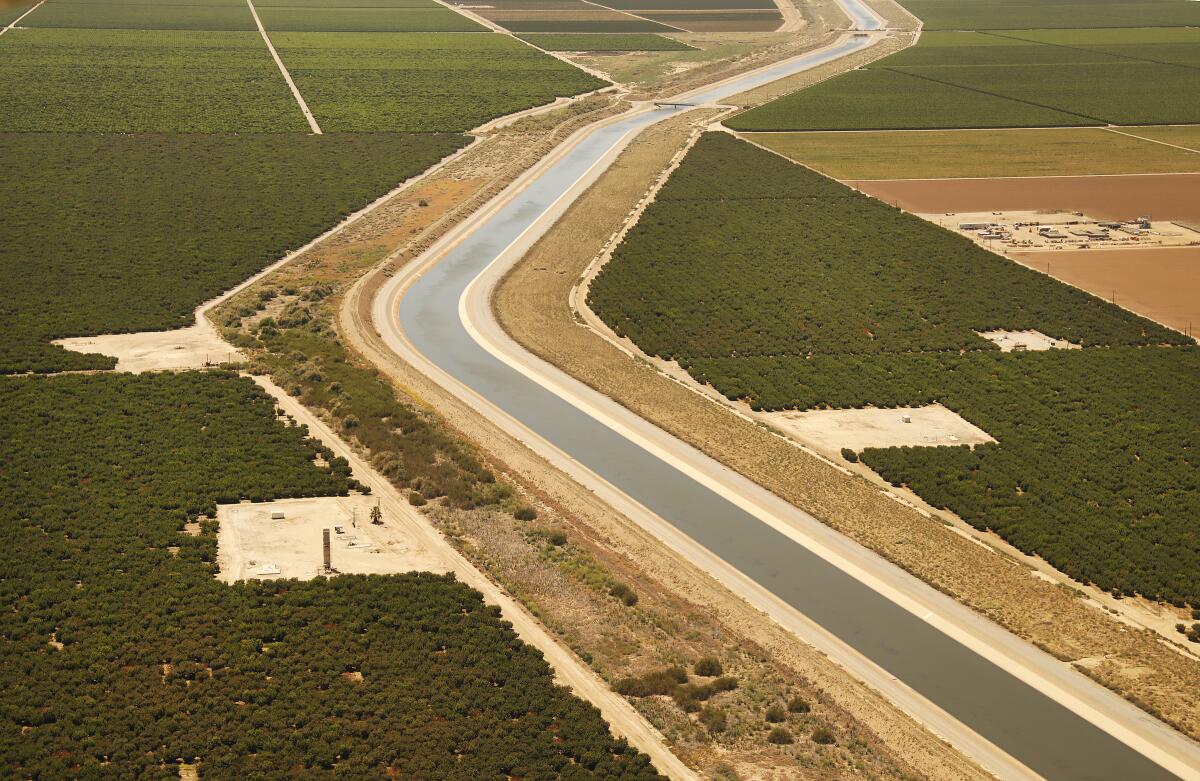
Even if Los Angeles and other Metropolitan customers are tremendously successful at conservation, recycling, stormwater capture and groundwater cleanup, they’ll still likely be heavily dependent on imported water for years to come. Likewise, even the biggest boosters of traditional water infrastructure acknowledge that local supplies represent a big part of the region’s future.
And sometimes, the choice isn’t as simple as subbing in local water resources for far-flung supplies.
Melanie Winter, founder and director of the River Project, said L.A.’s focus on recycling wastewater from large sewage treatment plants has diverted attention and budgets away from conservation and smaller-scale, nature-based solutions — such as adding public parks and limiting housing in floodplains — that allow rainwater to soak into the soil, replenishing aquifers.
Support our journalism
Your support helps us deliver the news that matters most. Subscribe to the Los Angeles Times.
Those types of solutions, Winter said, would reduce the need for energy-intensive sewage treatment plants. They’d also suck carbon from the atmosphere, improve air quality, expand biodiversity, cool down neighborhoods and make it easier to remove concrete from the Los Angeles River and other streams. And they’d help keep water flowing through those streams, which are now sustained in part by discharges from sewage treatment plants — discharges that will begin to diminish as recycling ramps up.
Recycling “should be a tool in our toolbox, but it shouldn’t be the only tool,” Winter said.
“Local leaders have been promoting recycled water as a silver bullet,” she said. “They are putting all their eggs in one basket. “
